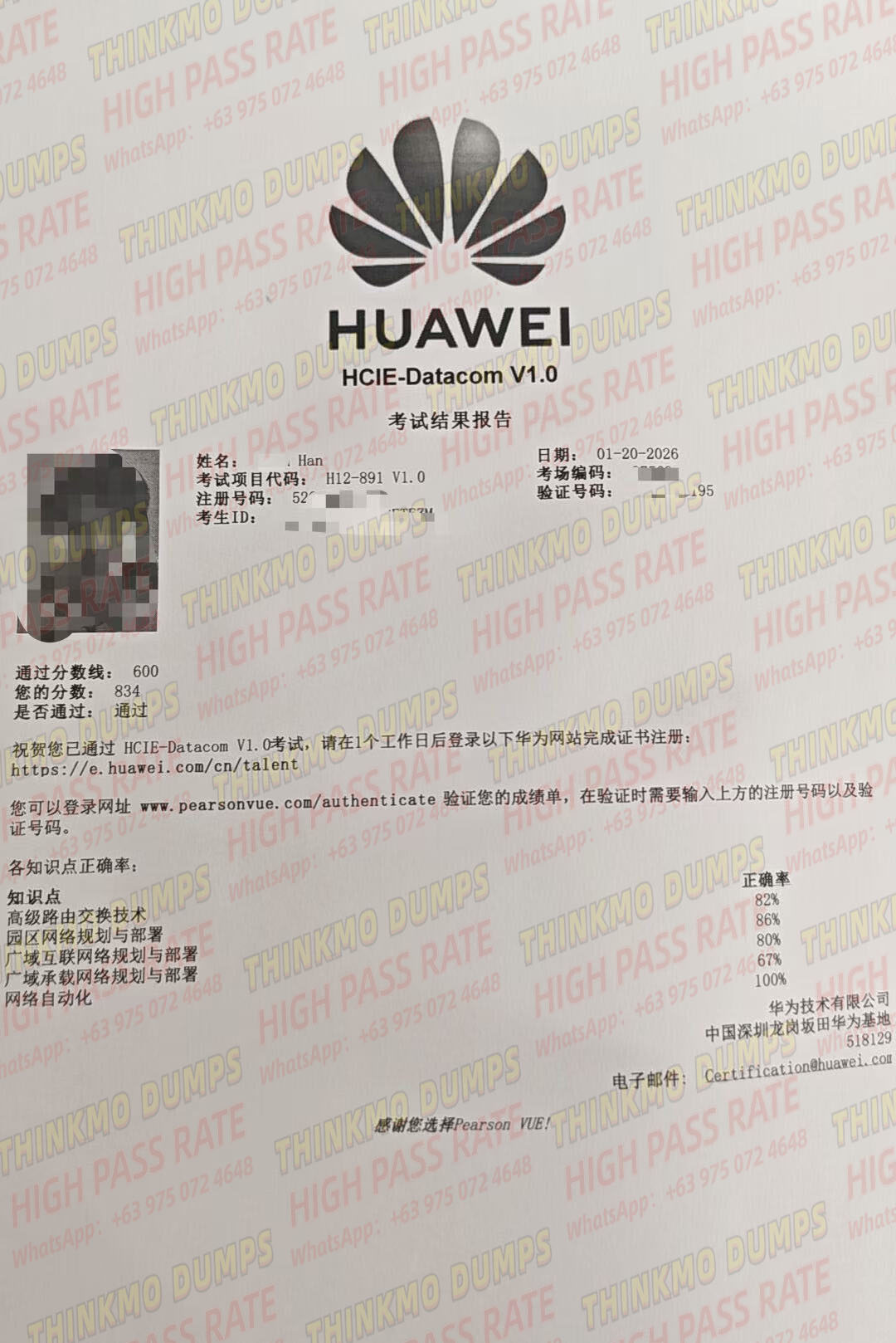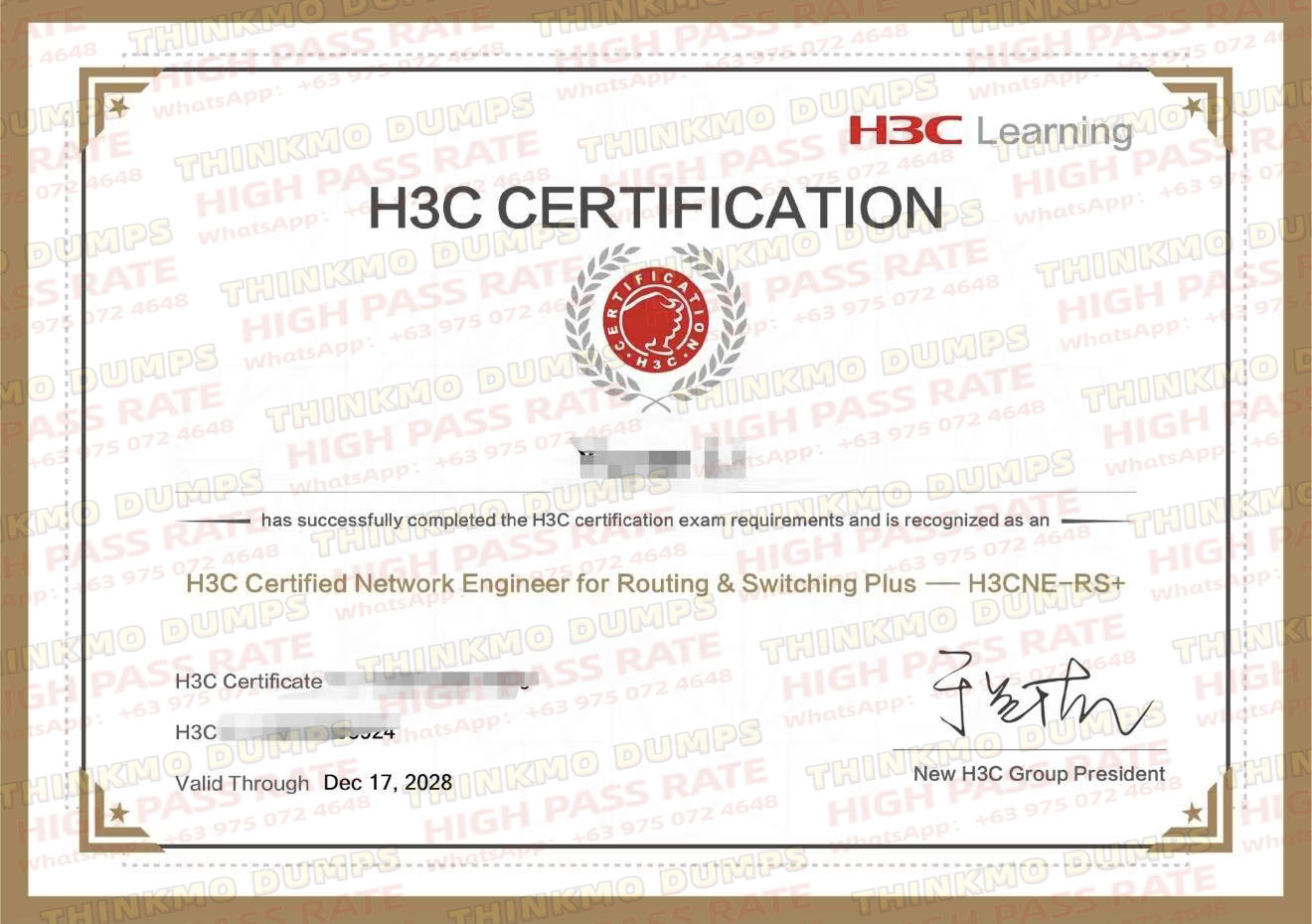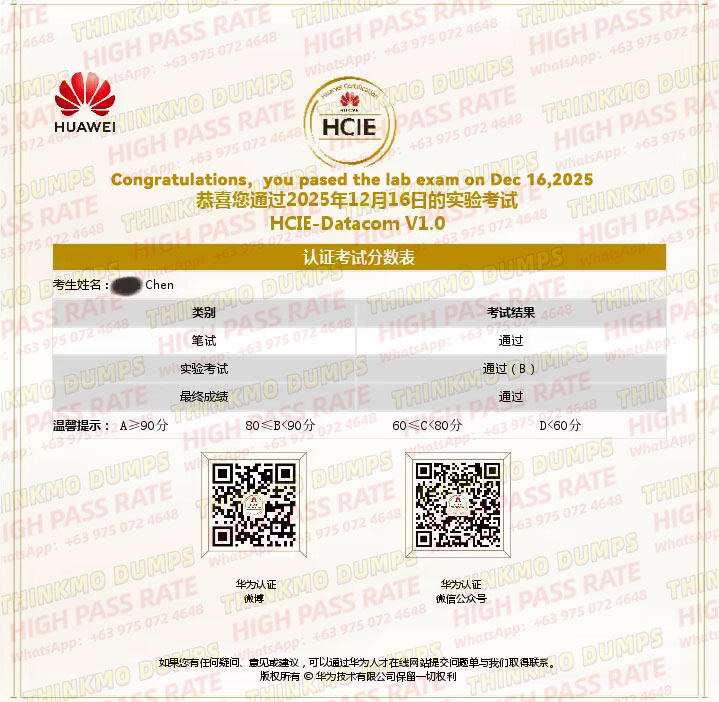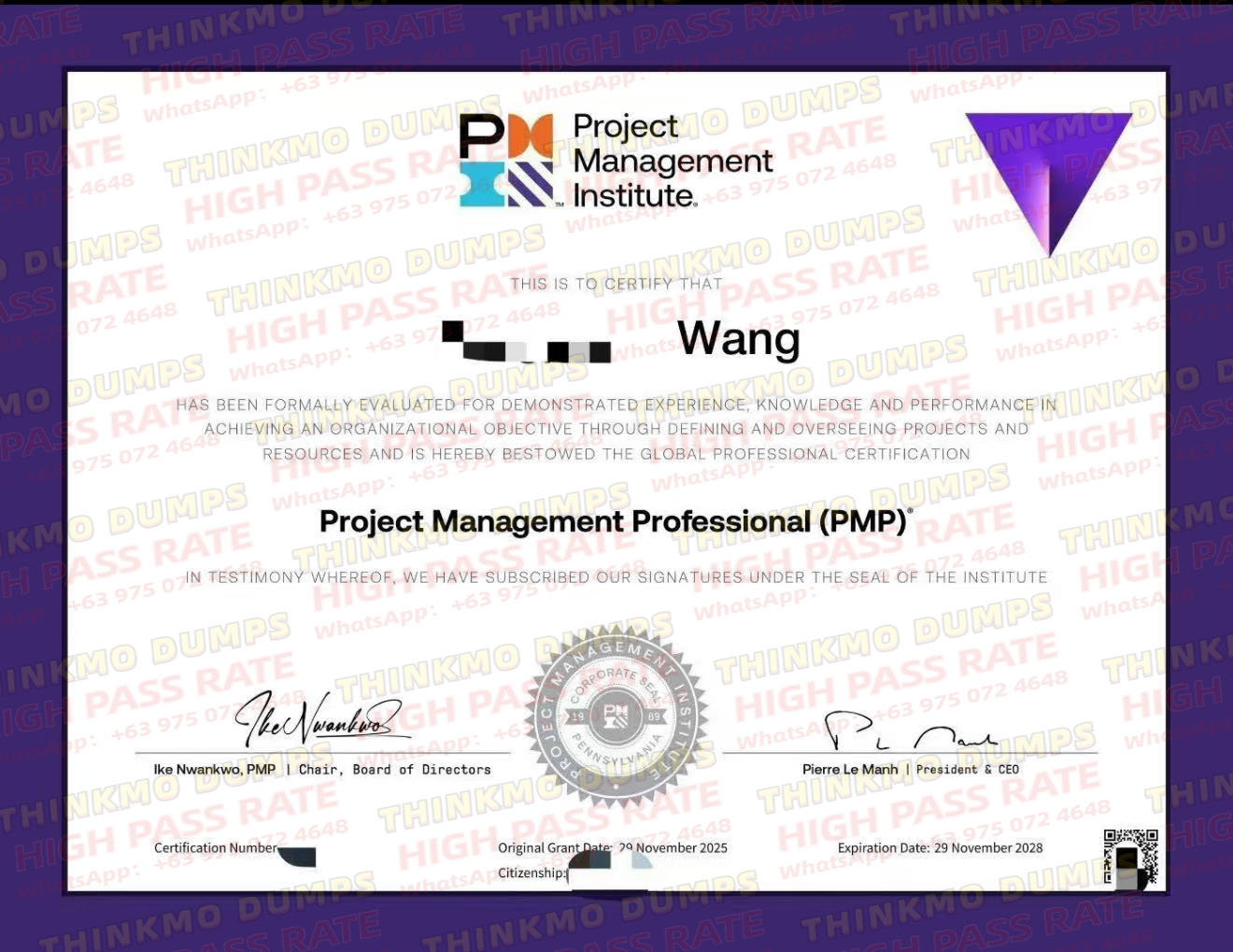What Is Cisco Certification and What Are the Benefits?
Update time:2025-09-15
Cisco Certification is a globally recognized ICT skill certification system launched by Cisco, covering networking, security, data centers, and more.It follows a three-level progression (CCNA → CCNP → CCIE), designed to match different career stages.Below, we’ll break it down by certification framework, career value, and preparation strategies, so you can decide whether it’s right for you — and how to prepare efficiently.

1.Cisco Certification Framework: A Three-Level Progression
Cisco certifications focus on the Enterprise track, progressing step by step with no skipping required:
CCNA (Associate) – Entry-Level Network Engineer
Focus: Fundamentals such as TCP/IP, VLAN configuration, and routing basics
Exam: 120 minutes, multiple-choice + simulation questions, 1000 points total, 825 passing score
Best for: Graduates or career changers, with a typical prep time of 2–3 months

CCNP (Professional) – Enterprise Network Operations
Focus: Complex enterprise networks, including BGP routing, MPLS VPN, and high availability clusters
Exam: 1 core exam + 1 concentration exam (e.g., security or wireless)
Best for: Professionals with 1–2 years of experience aiming for mid-level roles, 3–4 months prep

CCIE (Expert) – Network Architect/Expert
Focus: Advanced design and troubleshooting in multinational enterprise networks
Exam: Written exam + 8-hour lab exam, very few certified professionals worldwide
Best for: Senior engineers with 3+ years’ experience, preparing 6–12 months

2.Career Value: How Cisco Certification Helps You
Entry to the Industry – Breaks resume screening barriers
CCNA can replace project experience for fresh graduates or career changers.
Many large enterprises and multinationals treat it as a hidden requirement for junior roles.
Salary Boost (10%–50% premium)
CCNA: 7k–9k RMB entry-level salary in Tier-1 cities (10%–15% higher than uncertified peers)
CCNP: 9k–12k RMB with 1 year experience (20% premium)
CCIE: 250k+ RMB annual salary, especially valued in multinational firms
Structured Skill Development
Builds knowledge from fundamentals → configuration → troubleshooting
Example: mastering OSPF neighbor establishment troubleshooting instead of fragmented learning
Global Recognition
Accepted worldwide, especially by Cisco ecosystem partners and global enterprises
Supports international job applications and cross-border projects
3.Preparation Strategies (with Dumps)
CCNA – Focus on Fundamentals
Resources: Official study guides + Cisco Networking Academy free content
Practice: Cisco Packet Tracer for building small topologies (VLAN, OSPF)
CCNP – Focus on Scenarios & Operations
Tools: GNS3/EVE-NG simulators for enterprise-level labs (BGP route reflector, VPN scenarios)
Core Skills: High availability design, troubleshooting complex enterprise setups
CCIE – Focus on Troubleshooting & Labs
Resources: Official lab blueprints + remote rack practice
Training: Daily 2–3 hours of fault simulation (e.g., routing loops + ACL errors combined)
Instead of relying only on expensive training, many candidates now use reliable Cisco dumps. These provide:
4.Caution: Who Should Think Twice
Non-ICT professionals: For jobs like admin or finance, the certification has little career value.
Already certified experts: If you already hold senior-level certs (Huawei HCIE, Juniper JNCIE), your work experience may carry more weight than another certificate.
Conclusion
Cisco Certification is a visible proof of technical capability, valuable for:
Freshers or career changers entering ICT
Mid-level engineers aiming for promotions
Senior professionals targeting high-paying expert roles
Preparation should match your career goals and experience level.And remember: while the certificate opens doors, combining it with real-world practice and smart use of dumps is what truly maximizes its value.

1.Cisco Certification Framework: A Three-Level Progression
Cisco certifications focus on the Enterprise track, progressing step by step with no skipping required:
CCNA (Associate) – Entry-Level Network Engineer
Focus: Fundamentals such as TCP/IP, VLAN configuration, and routing basics
Exam: 120 minutes, multiple-choice + simulation questions, 1000 points total, 825 passing score
Best for: Graduates or career changers, with a typical prep time of 2–3 months
CCNP (Professional) – Enterprise Network Operations
Focus: Complex enterprise networks, including BGP routing, MPLS VPN, and high availability clusters
Exam: 1 core exam + 1 concentration exam (e.g., security or wireless)
Best for: Professionals with 1–2 years of experience aiming for mid-level roles, 3–4 months prep
CCIE (Expert) – Network Architect/Expert
Focus: Advanced design and troubleshooting in multinational enterprise networks
Exam: Written exam + 8-hour lab exam, very few certified professionals worldwide
Best for: Senior engineers with 3+ years’ experience, preparing 6–12 months
2.Career Value: How Cisco Certification Helps You
Entry to the Industry – Breaks resume screening barriers
CCNA can replace project experience for fresh graduates or career changers.
Many large enterprises and multinationals treat it as a hidden requirement for junior roles.
Salary Boost (10%–50% premium)
CCNA: 7k–9k RMB entry-level salary in Tier-1 cities (10%–15% higher than uncertified peers)
CCNP: 9k–12k RMB with 1 year experience (20% premium)
CCIE: 250k+ RMB annual salary, especially valued in multinational firms
Structured Skill Development
Builds knowledge from fundamentals → configuration → troubleshooting
Example: mastering OSPF neighbor establishment troubleshooting instead of fragmented learning
Global Recognition
Accepted worldwide, especially by Cisco ecosystem partners and global enterprises
Supports international job applications and cross-border projects
3.Preparation Strategies (with Dumps)
CCNA – Focus on Fundamentals
Resources: Official study guides + Cisco Networking Academy free content
Practice: Cisco Packet Tracer for building small topologies (VLAN, OSPF)
Exam Prep: Use updated CCNA dumps to strengthen weak points and simulate the real test
CCNP – Focus on Scenarios & Operations
Tools: GNS3/EVE-NG simulators for enterprise-level labs (BGP route reflector, VPN scenarios)
Core Skills: High availability design, troubleshooting complex enterprise setups
Exam Prep: Leverage CCNP-level practice dumps for targeted revision
CCIE – Focus on Troubleshooting & Labs
Resources: Official lab blueprints + remote rack practice
Training: Daily 2–3 hours of fault simulation (e.g., routing loops + ACL errors combined)
Exam Prep: Use full-simulation CCIE dumps that mimic both the written and lab exams, helping identify patterns and reduce failure risks
Instead of relying only on expensive training, many candidates now use reliable Cisco dumps. These provide:
The latest recall-based real exam questions
Detailed explanations to reinforce concepts
Full-simulation practice to boost pass rates
4.Caution: Who Should Think Twice
Non-ICT professionals: For jobs like admin or finance, the certification has little career value.
Already certified experts: If you already hold senior-level certs (Huawei HCIE, Juniper JNCIE), your work experience may carry more weight than another certificate.
Conclusion
Cisco Certification is a visible proof of technical capability, valuable for:
Freshers or career changers entering ICT
Mid-level engineers aiming for promotions
Senior professionals targeting high-paying expert roles
Preparation should match your career goals and experience level.And remember: while the certificate opens doors, combining it with real-world practice and smart use of dumps is what truly maximizes its value.
I'm your man who have the 100% valid dumps , buy it now for 50% off to clear your exam!
Click it ↓↓

Hot article
-
 1
1 1. ThinkMo Precise Question Bank: Ace HCIE Written
上传:2026-01-23
-
 2
2 Triple H3CNE/H3CSE Passes | ThinkMo Christmas Succe
上传:2025-12-25
-
 3
3 Success Streak: ThinkMo’s Dec HCIE-Datacom Win
上传:2025-12-24
-
 4
4 ThinkMo Guide: Cisco & Huawei Certification Com
上传:2025-12-22
-
 5
5 Pass CCIE/CKA Exams with ThinkMo’s Top Question B
上传:2025-12-19








